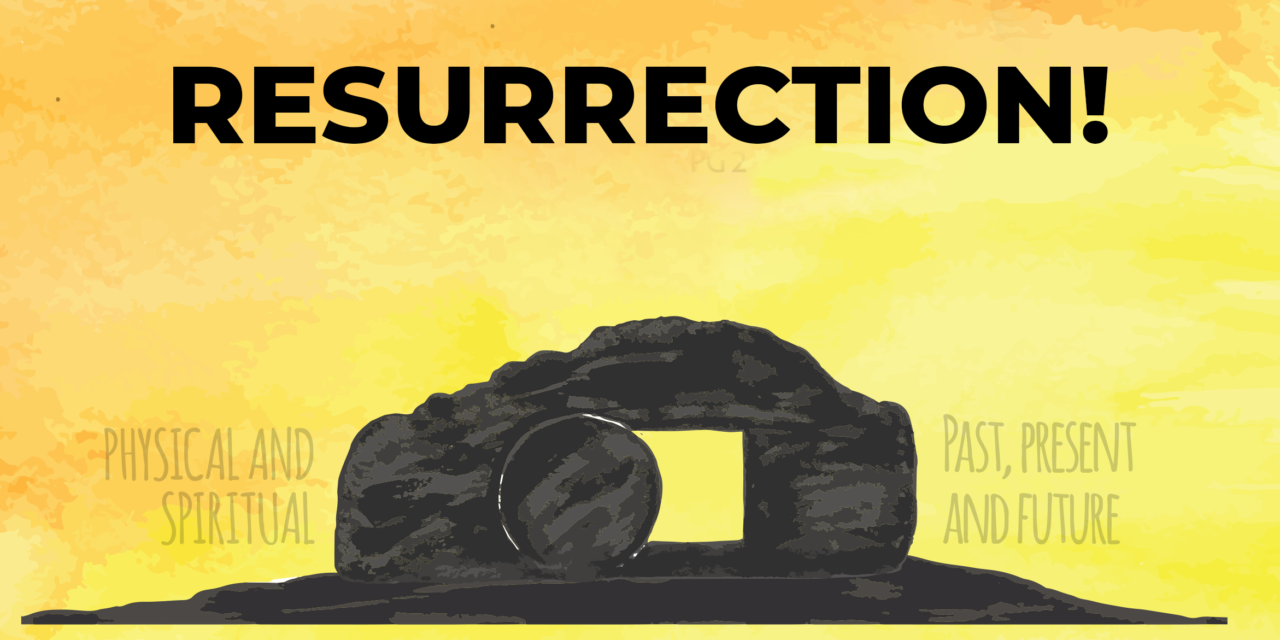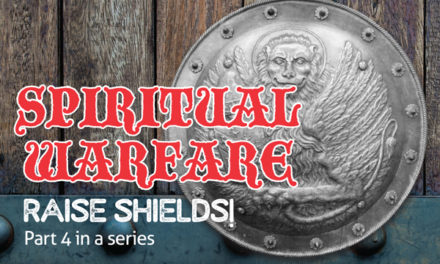“I will raise him up on the last day.” (John 6:40,44,54)
Three times Jesus makes this statement; thrice He gives this promise, embedded in His elucidation on being the “bread of life” (John 6:32-58). What an interesting choice of symbolism Jesus used, for bread is found universally; albeit in various forms and made from a variety of ingredients, it is a staple in the diet of millions of people of all walks of life. They regard it as a familiar, necessary substance. Jesus even taught us to petition our heavenly Father to “give us this day our daily bread” (Matthew 6:11) because God is both the Supplier and Sustainer of all life, physical and spiritual. “‘Truly, truly I say to you, it was not Moses who gave you the bread from heaven, but My Father gives you the true bread from heaven. For the bread of God is He who comes down from heaven and gives life to the world.’ Jesus said to them, ‘I am the bread of life; whoever comes to Me shall not hunger’” (John 6:32,33,35). Jesus Himself, then, is to be our daily source of supernatural nourishment and spiritual life, but not just day by day in this limited, fleeting existence.
The will and plan of God is much greater, as Jesus then went on to explain: “And this is the will of Him who sent Me, that I should lose nothing of all that He has given Me, but raise it up on the last day.” (John 6:39 – emphasis added) First, but only once, Jesus mentions that He will lose no thing, no object in the created physical realm, but sometime in the future He will resurrect all of redeemed creation to a new and pure existence. 2 Peter 3:13 tells us that, “according to His promise we are waiting for new heavens and a new earth in which righteousness dwells.” (That “promise” is found in Isaiah 65:17.) This resurrection will apply to all of the created physical realm redeemed by the sacrifice of Jesus Christ, including the bodies of believers. “For the creation was subjected to futility, …in hope that the creation itself will be set free from its bondage to decay and obtain the freedom of the glory of the children of God. For we know that the whole creation has been groaning together in the pains of childbirth until now. And not only the creation, but we ourselves, who have the firstfruits of the Spirit groan inwardly as we wait eagerly for …the redemption of our bodies.” (Romans 8:20-23) The apostle Paul further explained that what now physically exists must first end its existence in its present form in order to be raised “imperishable” and “in glory”, “in power”, spiritual and immortal (1 Corinthians 15:35-37,42-44,53).
This future physical resurrection of the redeemed is only part of God’s plan, however, and Jesus may have had more in mind when He repeatedly stated His intention to “raise him up on the last day.” The same Greek word is translated “last” in all the verses where He makes that assertion, and it means, “farthest, final (of place or time), ends of, last, latter end”. So let’s look more closely at these Scriptures and their context for, unlike most of us, God does not repeat Himself because He’s forgetful. In fact, repetition with God is confirmation of the validity and assurance of a matter. “By the mouth of two or three witnesses every word shall be established.” (2 Corinthians 13:1, quoting Deuteronomy 19:15) Nothing could be more certain or true than that proclaimed by God the Father, Jesus the Son, and the Holy Spirit!
In verse 40 Jesus said it’s the will of God that everyone (no exclusions or exceptions) who “sees the Son and believes in Him may have everlasting life,” and that includes spiritual life at the present time. This necessitates repeatedly ‘dying’ to self and a daily ‘resurrection’ (Luke 9:23,24) in order to currently experience eternal life (which Jesus defined as knowing God – John 17:3). In a sense each day is a ‘last day’ because it is currently the finale of time, for tomorrow has not yet arrived. Therefore, as Romans 8:11 explains: “If the Spirit of Him who raised Jesus from the dead dwells in you, He who raised Christ Jesus from the dead will also give life to your mortal (still physical) bodies through His Spirit who dwells in you.” “If by the Spirit you put to death the deeds of the body, you will live.” (Romans 8:13) So as we presently and continually look to Jesus, renouncing our sins and believing in His working in our lives (Philippians 2:13), we are ‘resurrected’ and experience a spiritual “newness of life.” (Romans 6:3-11) Moreover, this new life is to be a victorious one, for God “always leads us in triumphal procession in Christ” (2 Corinthians 2:14). (Note that the first part of the word ‘procession’ is ‘process’!) If you’re struggling today, saint, weighed down by your circumstances, overwhelmed by your situation, or frightened by your future, receive the LORD’s words of encouragement and take His promises to heart! God CAN NOT and WILL NOT fail you!! The Father, Son, and Holy Spirit are willing and able to raise you up over your circumstances, above your situation, from your fears! You cannot resurrect yourself, any more than Lazarus could; but Jesus called him from the temporary grave he was in (John 11:38-44). So, you can be confident that “He who began a good work in you” will continue at it until complete perfection is achieved at His coming (Philippians 1:6). Let that sink in deep: HE is doing the work; we cannot! “Now may the God of peace Himself sanctify you completely; and may your whole spirit, soul, and body be preserved blameless at the coming of our Lord Jesus Christ. He who calls you is faithful, who also will do it.” (1 Thessalonians 5:23,24)
Our Lord’s assurance for our resurrection can also be viewed in the past sense. In verse 44 of John, He refers to all those who come to Him as being drawn by the Father, which resulted in spiritual birth. This past resurrection was from being “dead in trespasses and sins” (Ephesians 2:1; Colossians 2:13). Here the framework is salvation, and when a person is “born again” of God’s Spirit (John 3:5-7), he has his ‘last day’ separated from God, and is ‘raised up’ from a natural life and made a “new creation” in Christ (2 Corinthians 5:17). “Present yourselves to God as those who have been brought from death to life” (Romans 6:13).
Lastly, in John 6:54, Jesus acknowledges the reality of eternal life now and gives the promise for the future resurrection of the physical body. In this context resurrection on the last day is linked with communion, the commemoration of Christ’s physical death and the anticipation of His soon-coming return for His saints (1 Corinthians 11:26). In other words, in order to participate in a future resurrection unto life (Revelation 20:6) – rather than unto damnation (Revelation 20:13-15) – one must personally identify with the sacrificial death of Jesus Christ. “Then Jesus said to them, ‘Most assuredly, I say to you, unless you eat the flesh of the Son of Man and drink His blood, you have no life in you.’” (John 6:53) Jesus went on to explain (John 6:58): “This is the bread which came down from heaven – not as your fathers ate the manna, and are dead.” (In other words, this isn’t dealing with physical, literal existence.) “He who eats this bread will live forever.” (This relates to the spiritual, eternal realm.) Because He died for us and rose from the dead, Jesus Christ – and He only – can legitimately promise and successfully deliver resurrection life – past, present, and future – to all who believe in Him.
“He has risen as He said.” (Matthew 28:6) “I am the resurrection and the life. Whoever believes in Me, though he die (physically), yet shall he live (spiritually, eternally), and everyone who lives (spiritually) and believes in Me shall never die (spiritually). Do you believe this?” (John 11:25-26)






